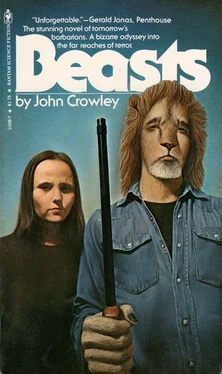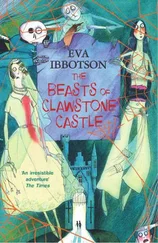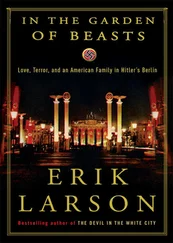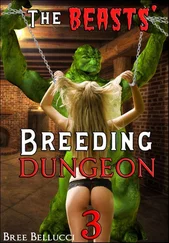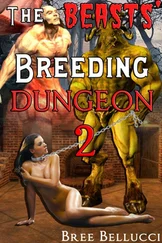They had gone on for some time before Sweets began to see the place that Painter had led them into.
Years before, during the wars, this band of city had been cleared, a buffer zone between the fractious island city and the Northern Autonomy. Even then, there had not been many people to evacuate; it had been for a long time a failure as a city. Now it was as deserted and hollowed as if it had been under the sea. The streets ran in the old rectangles around carious buildings, but the only human faces were those smilers, blinded with rust or torn and flapping, pictured in huge ads for products mostly no longer made.
Sweets could not have read, and Painter didn’t see, the new signs that announced that the Northern Autonomy was now a Federal protectorate, occupied by Federal troops, requiring Federal passports. All they both knew, with increasing certainty, was that they hadn’t escaped the city. It poured on past them as they walked, identical block after block. The sky had grown larger, the buildings lower; but it was still only dead city. When in the silence Painter began to hear, overhead, the quick insistent ticking, which seemed to have been pursuing him for years, he wasn’t surprised. He didn’t look up or run for cover, though Sweets pricked up his ears and looked up at Painter, ready at any moment to run, to hide. Painter walked on. The copter hovered, watching, and retreated.
From the copter the officer radioed in what he saw: a big man, maybe not a man, walking with some purpose through the streets, heading due north. “A lot of dogs around.”
“Dogs, over?”
“Dogs. Lots of them. Over…”
Painter reached an impassable valley: the empty cut of a sunken expressway. He turned northwest, walking along the edge of the expressway embankment. Far off as the road ran, but ahead, visible, the horizon could be seen, the true horizon, earth’s, a bristle of leafless trees, soft rise of a brown hill, pale sun staining yellow a cape of winter clouds.
There , Painter said. The freedom i promised you. Go now .
Not without you .
Yes. Without me .
There were engines coming closer, coming through the maze of stone toward them. It must be toward them: they were the only living things here.
The rest of the pack had fled along the intersecting streets. High above, the copter looked down, watching them flee away, watching the big one in the fur coat and the dog who stayed beside him walk on. The copter could see where they would intersect with the cruisers: at the cut there, steep as a chute, that led down onto the expressway. He watched them come together.
The cruisers climbed the chute toward Painter and Sweets. They stopped, tires shrieking. Men popped out of them, shouting, armed. Painter stopped walking. Go now , he said. Go where I told you .
Sweets, torn in two, wanting only to die at Painter’s side, yet overwhelmed by Painter’s command to go, stood, riveted. The rest of the pack had fled. His mind, stretched almost to breaking, insisted that to follow his master now he must flee, must do what he could not. Must .
Painter started down the cut toward the waiting men. Why had he thought there was any escape from them, anywhere to run where they were not? He tossed away the gun, which clattered on the stone and spun for a moment like a top. He had never escaped; only, for a time, escaped notice.
Sweets watched Painter raise his arms gently as he walked toward the men. Then, before he could see them touch him, before they slew him with their touch, he turned and ran. He bounded north, fast, forcing his legs to stretch, to betray: betray betray betray his feet said as they struck the hard, endless stone of the city street.
6
VOX CLAMANTIS IN DESERTO
On Mondays Loren came in to meet the packet plane that flew in once a week with supplies and mail to a small town ten miles or so from his cabin. To get into town, he had to canoe from his river-island observation station, where he spent most of the week, downriver to his cabin. From there he went on muleback to town. He rarely got back to the cabin before midnight; the next morning he would start out before dawn, and canoe back upriver to the island. Then, as though the whole of this journey had set him vibrating on a wrong note, he would have to spend most of that day untuning himself so that he could once again turn all his attention to the flock of Canada geese he had under observation. If he brought whiskey back from town to the cabin, he would struggle with himself to leave it in the cabin, having sometimes to go so far as to pour it out, or what was left of it. He kept himself from ever bringing any to the island; but this struggle made his first day’s work at the island that much harder.
There weren’t, every week, enough reasons for him to make the journey into town, as far as supplies or necessities went. Yet he made it. He tried hard to stock up on things, to deprive himself of logical reasons for the trip; yet when he couldn’t stock up, when some supply was short that week in town and he saw that he would have no choice but to return, he felt a guilty relief. And even when he had utterly subjugated all these tricks, and had no reason to come in that even self-deception would buy, he came in anyway. Always. Because there was one thing he couldn’t stock up on, and that was mail. Each week, that was new; each week it bore the same promise, and like the stupid chickens he had experimented with in school, each time there was no mail, he responded more fiercely the next time.
“No mail” meant no letter from Sten. He got enough other things. Dross. Newspapers he soon became unable to read with any understanding. Letters from other scientists he corresponded with about technical matters, about the geese. They weren’t what brought him to town. Nor was it the whiskey either, really. The whiskey more or less resulted from the mail or the lack of it; or, what brought him into town for the mail brought him later to the whiskey. It all came to the same impulse. A syndrome, he knew he had to call it; yet it felt more like a small, circumscribed suburb of hell.
Even Loren Casaubon, who had dissected many animals, from a nematode worm to a macaque monkey — which began to decay loathsomely in the midst of his investigations, insufficiently pickled — even he located the seat of his fiercest and most imperative emotions in his heart. He knew better, but that’s where he felt them. And it seemed, over the last months, that his heart had suffered physical strain from the vast charge of emotion it continuously carried: it felt great, heavy, painful.
That Monday the packet was late. Loren had a not-quite-necessary reshoeing done on the mule, watching the smith work gracelessly and hastily and wondering if these old skills that had once meant so much to the world, and seemed to be becoming just as necessary again, would ever be done as well as they once had been. He picked up a box of raisins and a dozen pencils. He went down to the muddy end of the street, to the rusting steel pier, and waited. He had been born patient, and his patience had undergone training and a careful fine-tuning in his work. He could remember, as a kid, waiting hours for a dormant snail to put out its head or a hunting fox to grow accustomed to his stationary, downwind presence and reveal himself. And he used those skills now to await, and not attempt to hasten, the guttural far-off sound, the clumsy bird.
It appeared from the wrong direction, made maneuvers around the skyey surface of the lake. Its ugly voice grew louder, and it settled itself down with a racing of engines and a speeding and slowing of props that reminded him of the careful wing-strategies of his landing geese. It must be, he thought, as its pontoons unsteadily gripped the water’s stirred surface, the oldest plane in the world.
Читать дальше
